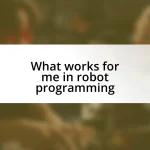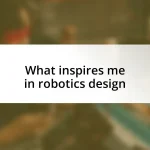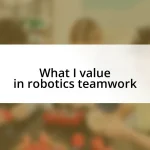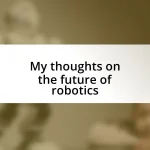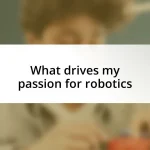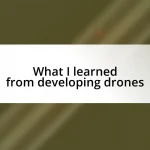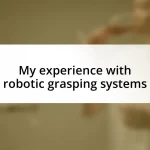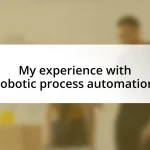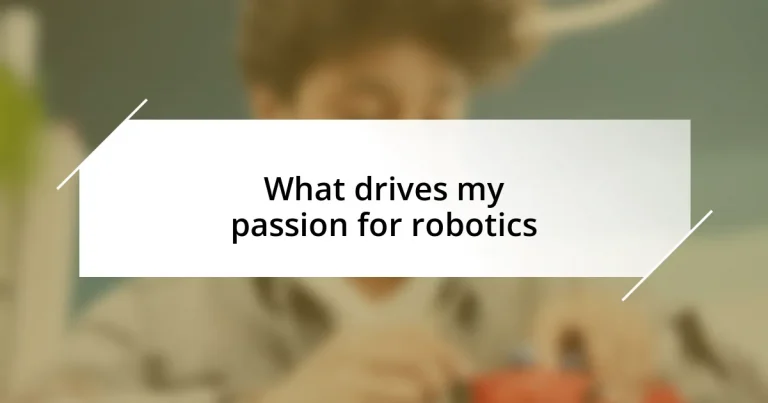Key takeaways:
- The author discovered their passion for robotics in high school, driven by the excitement of building machines and the impact on real-world problems.
- Community engagement and collaboration with peers played a significant role in nurturing their interest and confidence in robotics.
- Hands-on experiences, such as workshops and competitions, provided vital opportunities for learning, teamwork, and innovation.
- Future trends in robotics, including emotional recognition and sustainability initiatives, further ignite the author’s enthusiasm for the field.
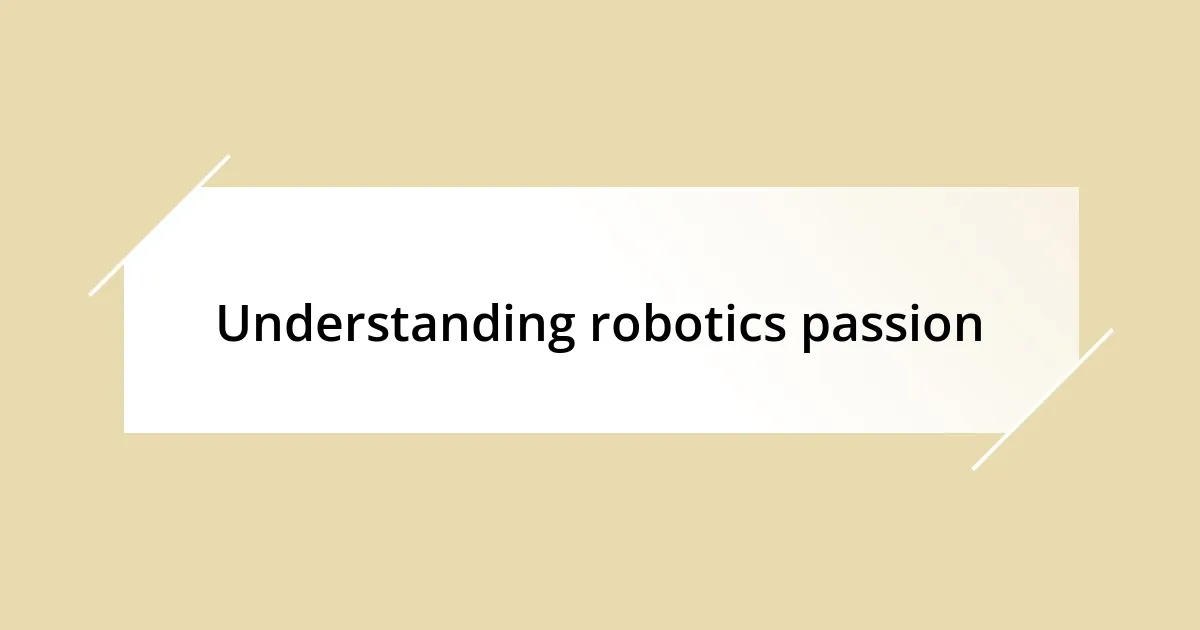
Understanding robotics passion
When I first encountered robotics in my high school technology class, something clicked inside me. It wasn’t just about building machines; it felt like breathing life into ideas. That spark turned into a passion fueled by the thrill of endless possibilities—what can we create next?
Have you ever felt that rush of excitement when a project comes together? I remember the first time a robot I designed successfully navigated a simple maze. The sense of accomplishment was exhilarating! It’s moments like these that deepen my love for robotics; they remind me of the incredible intersection between creativity and engineering.
As I continue to explore this field, I often reflect on what drives my passion. It’s more than just the technical challenges; it’s the transformative impact robotics can have on our daily lives. The thought that I could contribute to innovations that solve real-world problems—how could that not inspire a sense of purpose and fulfillment?
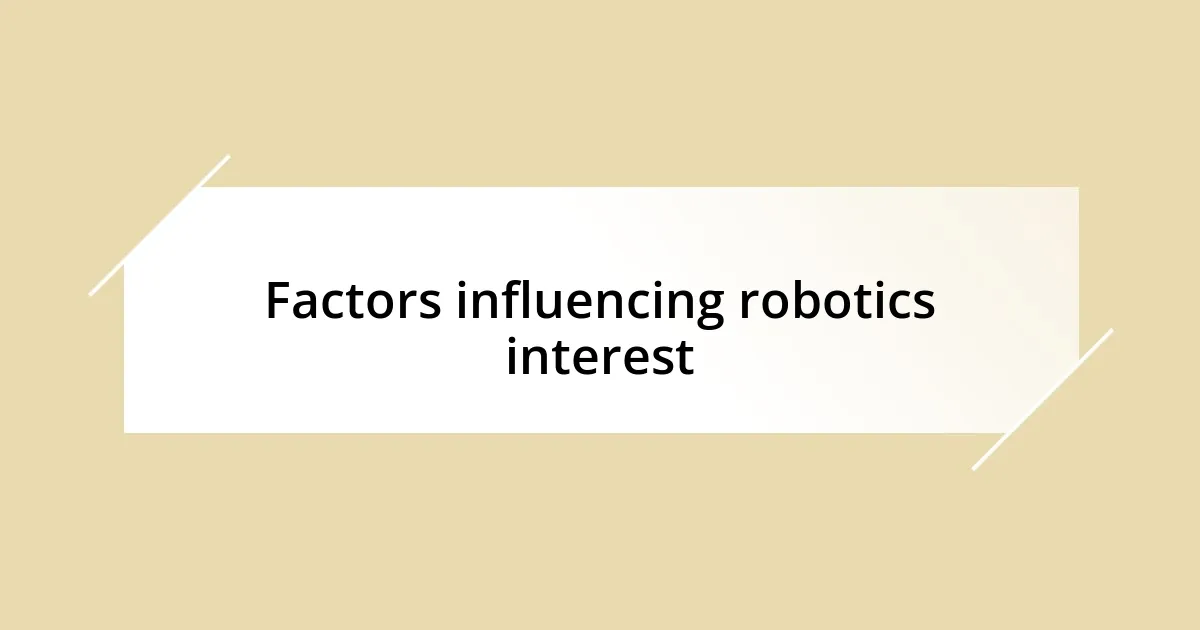
Factors influencing robotics interest
When I talk to fellow enthusiasts, a common thread emerges: the influence of technology in our daily lives. It’s fascinating how advancements in artificial intelligence and machine learning draw people into robotics. I vividly remember being captivated by a demonstration of a robotic arm that mimicked human movements. Watching it perform intricate tasks was a turning point for me, igniting a desire to understand the complexities behind such technology and its potential.
Another influencing factor is the sense of community and collaboration within the robotics field. I recall joining a local robotics club and finding a group of like-minded individuals who shared the same passion. We collaborated on various projects, and the camaraderie boosted my interest immensely. There’s something truly special about exchanging ideas and learning from others; it reinforces the idea that robotics isn’t just a solitary pursuit but a collective journey filled with support and inspiration.
Lastly, hands-on experience plays a crucial role in nurturing robotics interest. I remember feeling a surge of excitement when I built my first robot kit. Tinkering with the components and watching it come to life was nothing short of magic! It’s a reminder that getting your hands dirty is essential; it creates a deeper connection with the subject matter and often leads to the “aha” moments that keep the passion alive.
| Factor | Impact |
|---|---|
| Technological Advances | Inspire curiosity and innovation |
| Community Engagement | Fosters collaboration and shared learning |
| Hands-on Experience | Creates a personal connection and excitement |
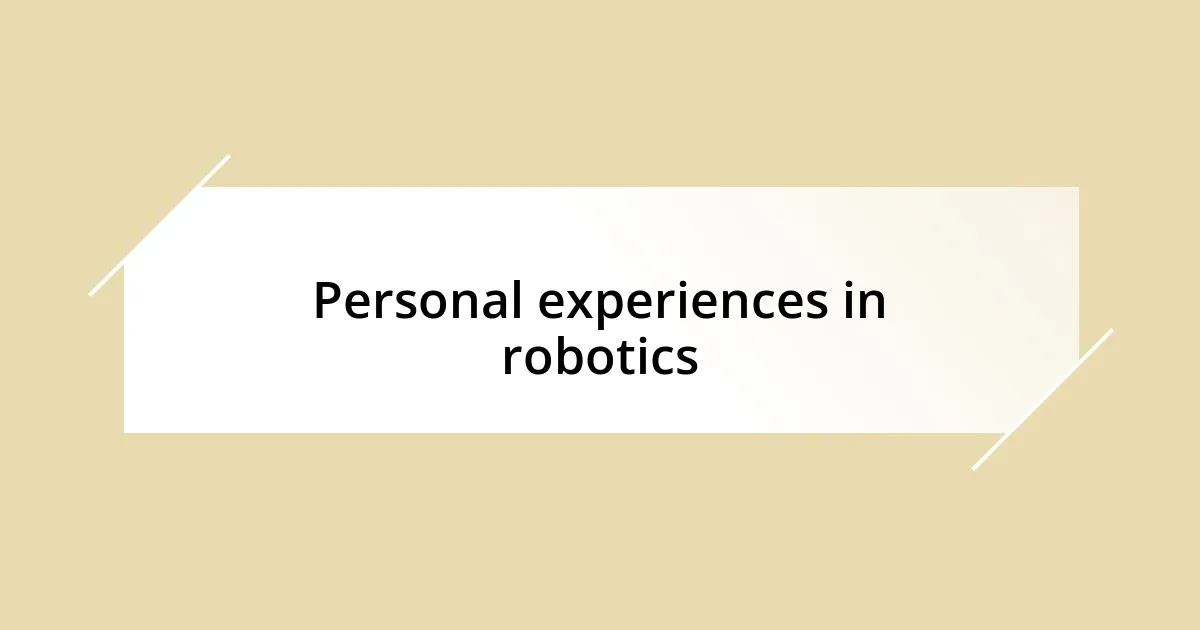
Personal experiences in robotics
Creating robots isn’t just a technical skill for me; it’s a deeply personal journey. I still remember the first time I attended a robotics competition. My heart raced as I watched teams make last-minute adjustments to their designs. That adrenaline rush, coupled with the passion everyone around me poured into their projects, ignited something inside me. I left that day not just inspired but eager to dive deeper into the world of robotics, realizing I was part of something larger than myself.
- I was amazed by the teamwork and innovation displayed at the competition.
- The energy in the air fed my desire to explore robotics more seriously.
- Participating made me recognize that robotics is a collaborative art.
Another unforgettable experience was when I participated in a summer robotics workshop. I teamed up with a group of students from all different backgrounds. That diversity was refreshing; we learned so much from one another! I distinctly remember the thrill of building a robot that could respond to voice commands. When our creation recognized my voice for the first time, I can’t describe how it felt—a mix of triumph and pure joy washed over me. Moments like those affirm my belief that robotics is not just about circuits and sensors; it’s about connections, shared joy, and the magic of turning dreams into reality.
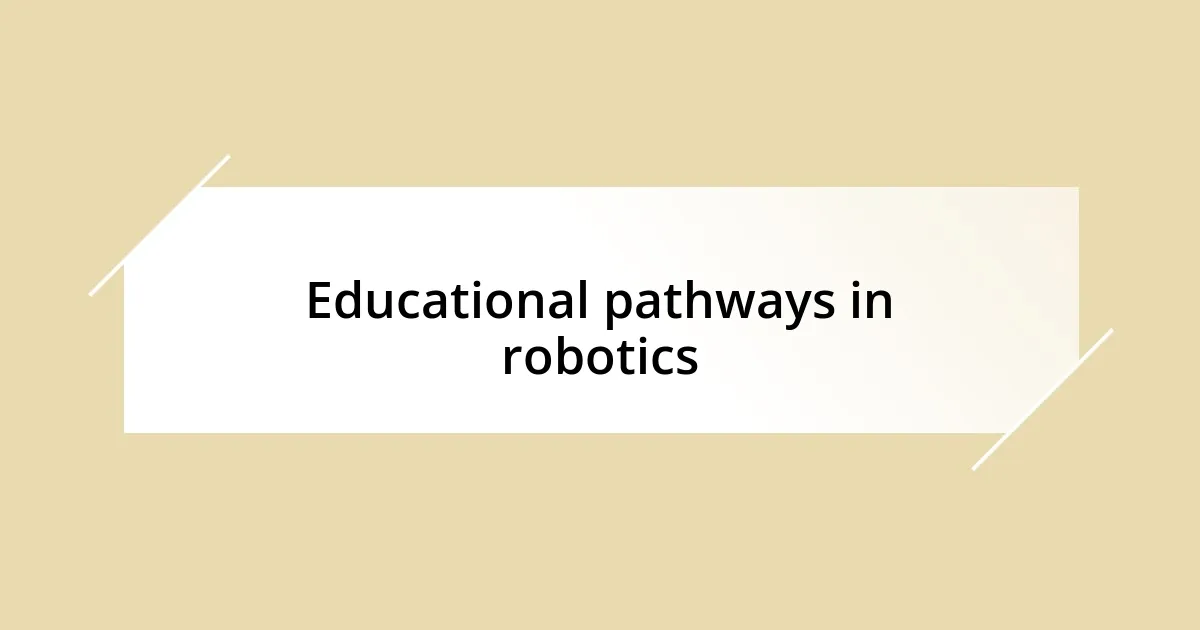
Educational pathways in robotics
Educational pathways in robotics can vary significantly depending on one’s interests and career goals. I often find myself reflecting on my own journey, which started with a solid foundation in mathematics and science during high school. These subjects not only equipped me with essential problem-solving skills but also sparked my curiosity about how technology could shape the future. If I hadn’t focused on STEM (Science, Technology, Engineering, and Mathematics) from an early age, would I have stumbled into the captivating world of robotics as easily?
I believe pursuing a degree in engineering, particularly mechanical or electrical engineering, can offer invaluable insights into robotics. For me, my time in university opened doors to hands-on experiences like internships and lab work. I remember working on a project that involved designing a robotic drone, and the thrill I felt as we began assembling the parts. Have you ever experienced that moment when theory meets practice? It’s exhilarating! Surrounding yourself with mentors who challenge your thinking and encourage innovation is truly a game-changer in this field.
Beyond formal education, technical certifications and online courses can provide a wealth of knowledge for aspiring robotics enthusiasts. I often explore platforms like Coursera and edX to advance my skills and stay current with industry trends. Just last month, I completed a course on robotic process automation, and the fresh perspectives I gained were eye-opening. What if, instead of following a traditional path, you could dive into specialized areas that truly fascinate you? Embracing personal exploration can lead to innovative projects that align with your passion.
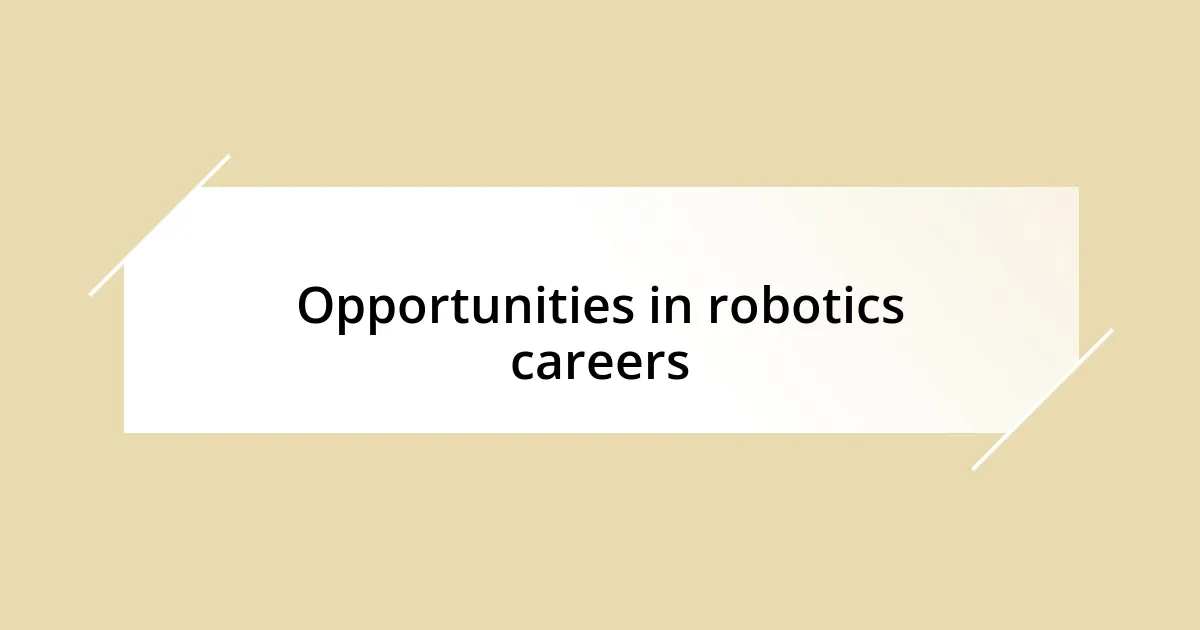
Opportunities in robotics careers
Exploring opportunities in robotics careers is like opening a treasure chest filled with possibilities. I recall a conversation with a mentor who shared their journey from an internship to landing a dream job at a robotics firm. They emphasized how critical those early experiences were in shaping their career. Isn’t it invigorating to think about how internships can be a stepping stone to fulfilling careers?
The rise of automation and artificial intelligence has propelled the robotics field into the spotlight, creating a multitude of job openings. From designing robotic systems for manufacturing to developing autonomous vehicles, the scope is vast. I once attended a tech fair that showcased a plethora of robotics companies eager to recruit fresh talent. The excitement in the air was palpable; I could feel the potential wrapping around me like a warm embrace. Have you thought about the different paths available, like research, software development, or even robotics sales? Each avenue offers unique challenges and rewards.
Moreover, the robotics industry is not just about technical skills; soft skills are equally vital. I’ve learned that communication, teamwork, and problem-solving can be just as important as knowing how to code. There was a project where I collaborated with artists to create robotic art installations, and it taught me how essential it is to blend creativity with technology. Can you imagine the impact of diverse perspectives on robotic innovation? Embracing a multidisciplinary approach can lead to groundbreaking solutions, making the field not only impactful but also incredibly rewarding.
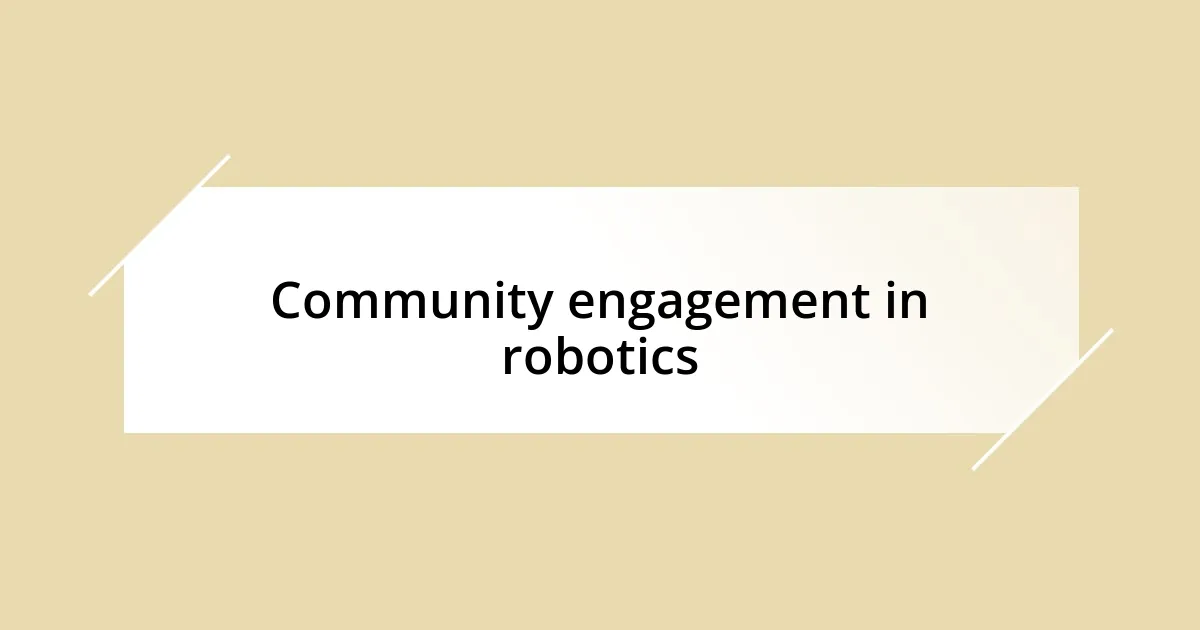
Community engagement in robotics
Community engagement in robotics is something I cherish deeply. I remember attending a local robotics competition where students from different schools came together to showcase their creations. The energy in the room was contagious! It was inspiring to witness young minds bonding over shared interests, exchanging ideas, and cheering each other on. Have you ever felt that rush of excitement when you realize you’re part of something bigger than yourself?
Participating in community workshops is another way my passion for robotics flourished. Early on, I joined a weekend club that invited anyone to tinker with robots, regardless of skill level. I was amazed at how beginners transformed into confident builders in just a few sessions. That inclusive environment sparked creativity and made technical concepts accessible to all. It’s fascinating to think about how community-driven initiatives can shape the next generation of roboticists. Isn’t it incredible to see how collaboration brings forth innovation?
I’ve also found that social media platforms and online forums enhance community engagement tremendously. Sharing experiences, asking for help, or even showcasing projects can lead to meaningful connections. I frequently participate in discussions where enthusiasts from around the globe share tips and celebrate each other’s successes. This sense of belonging ignites my passion even further. Have you considered how a simple post can lead to learning opportunities that may bring your own projects to life? The possibilities are endless when we come together as a community.
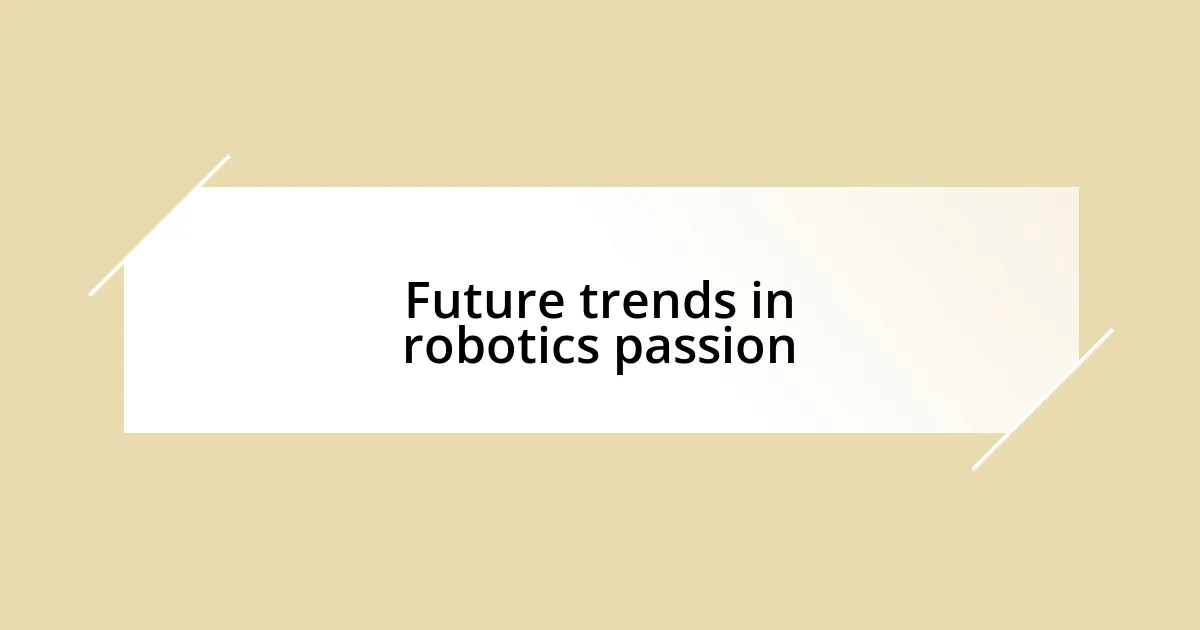
Future trends in robotics passion
Future trends in robotics passion are becoming increasingly exciting as technology evolves. I still remember the first time I saw a robot capable of mimicking human movements during a tech showcase; it sparked a fire in me to explore the potential of robotics in enhancing human capabilities. How will future innovations fuel your passion in ways we can’t even imagine yet?
As robotics continues to advance, I envision a rise in emotional robotics—machines that can understand and respond to human emotions. I once participated in a workshop where we programmed a simple robot to recognize cheerful faces and respond with happy sounds. The joy on my teammate’s face when we succeeded was unforgettable. Have you ever thought about how much more profound our connections with robots could become?
Moreover, integrating robotics with sustainability efforts is something I feel strongly about. I participated in a project that developed robotic systems for recycling—seeing the direct impact on the environment was incredibly fulfilling. It brings to light the question: how can we shape the future of robotics not only for technological advancement but also for a healthier planet? Exploring this intersection fuels my passion even more.
